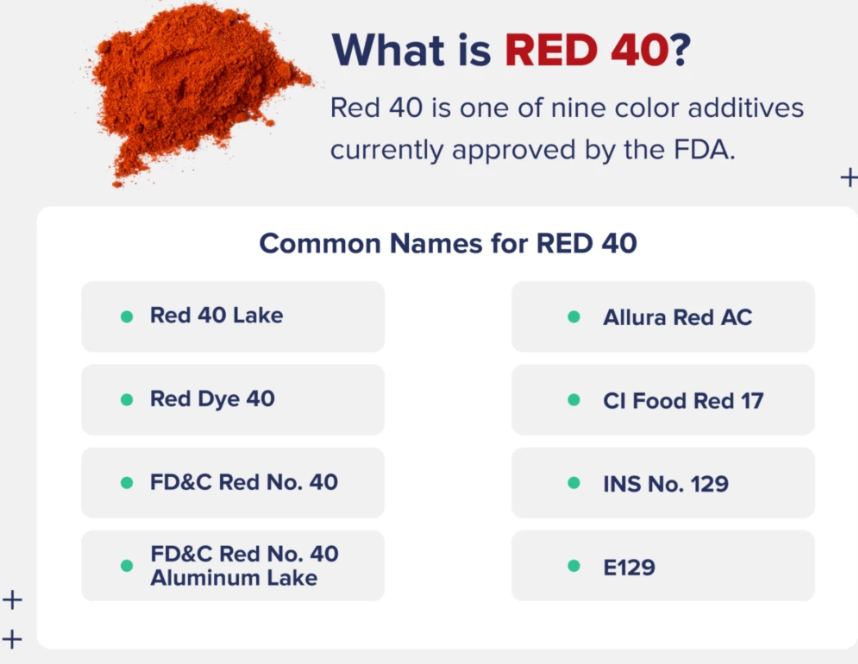BOURSESSENEGAL – When you pick up a colorful snack or a vibrant drink, have you ever wondered, “Is Red 40 bad for you?” This popular food dye, also known as Allura Red, sparks debates among consumers, health experts, and researchers. In this article, we will explore what is, its potential health effects, and whether you should be concerned about its presence in your food.
What Is Red 40?
Red 40 is a synthetic dye used to enhance the color of various food products. You’ll find it in candies, soft drinks, baked goods, and even some medications. Its bright red hue makes products visually appealing, especially to children. But, while it adds aesthetic value, many wonder about the safety of consuming this artificial colorant regularly.
The Production of Red 40
Manufactured from petroleum, Red 40 undergoes complex chemical processes to produce a stable and vibrant dye. It has been approved by the U.S. Food and Drug Administration (FDA) since 1971. However, just because it is approved doesn’t mean it’s free from controversy. Concerns continue to arise about its long-term effects on health.
Potential Health Risks Associated with Red 40
Many individuals question the safety of consuming products with Red 40. Understanding the potential health risks can help you make informed choices.
Allergic Reactions and Sensitivities
Some people experience allergic reactions to Red 40. Symptoms can include hives, headaches, and gastrointestinal issues. If you notice discomfort after consuming products containing this dye, consider eliminating them from your diet. Allergies to food additives can manifest in various ways, so it’s essential to listen to your body.
Hyperactivity and Behavioral Issues in Children
A significant concern involves the effect of Red 40 on children’s behavior. Studies have linked artificial colorings, including , to increased hyperactivity in some kids. Parents often report that their children become more restless or fidgety after consuming foods with artificial dyes. This connection has led many parents to seek out natural alternatives.
Digestive Problems
Another potential issue arises from consuming high amounts of Red 40. Some individuals report digestive discomfort, including stomach cramps or diarrhea, after eating products containing this dye. If you notice a pattern, it might be wise to limit your intake of such foods.
Long-Term Effects: What Do Experts Say?
Now that we understand the immediate effects, let’s explore what research says about the long-term impact of Red 40 on health.
Current Research and Findings
Most research indicates that Red 40 is safe when consumed in moderation. The FDA has established acceptable daily intake levels, suggesting that most people will not face adverse effects. However, long-term studies are limited, and more research is necessary to determine any lasting health impacts.
Nutritionists’ Perspectives
Nutritionists often advocate for whole, unprocessed foods, emphasizing the importance of a balanced diet. Many experts suggest that avoiding artificial additives like Red 40 is a proactive way to maintain health. They encourage reading labels and choosing foods with natural ingredients whenever possible.
How to Avoid Red 40 in Your Diet
If you’re concerned about the safety of Red 40, avoiding it is feasible with a few simple steps.
1. Read Food Labels Carefully
Make it a habit to read ingredient lists on packaging. Look for terms like “ “Allura Red,” or “E129.” Many companies now offer products that use natural colorings instead, so you might find appealing alternatives.
2. Choose Whole Foods
Focus on whole, unprocessed foods such as fruits, vegetables, and whole grains. These foods typically do not contain artificial dyes and offer numerous health benefits.
3. Research Brands
Some brands prioritize natural ingredients and avoid artificial additives. Researching brands can help you make healthier choices. Many companies are now transparent about their ingredients, which is a positive trend.
Conclusion: Should You Be Concerned?
So, is Red 40 bad for you? While it’s widely used and generally considered safe in moderation, individual reactions vary. Some may experience allergic responses or behavioral changes, particularly in children. If you have concerns, avoiding products containing can be a wise choice.
Ultimately, being informed empowers you to make better dietary decisions. Focus on a balanced diet rich in natural foods, and you’ll reduce your exposure to artificial additives. If you have specific health concerns, consult with a healthcare professional for personalized advice.
By being mindful of what you consume, you can enjoy your food while taking care of your health. Remember, knowledge is the first step toward making positive changes in your diet
REFERENCE : https://www.health.com/



